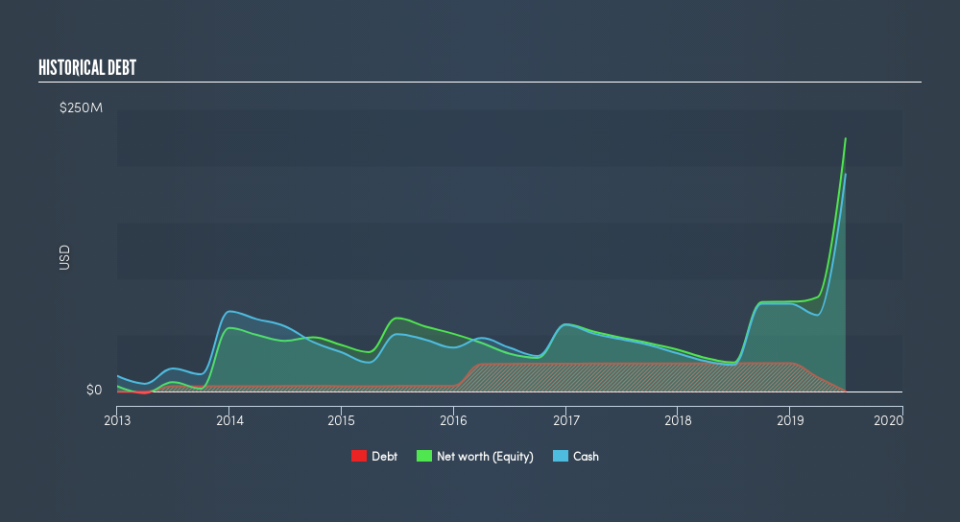Is Veracyte (NASDAQ:VCYT) A Risky Investment?

The external fund manager backed by Berkshire Hathaway's Charlie Munger, Li Lu, makes no bones about it when he says 'The biggest investment risk is not the volatility of prices, but whether you will suffer a permanent loss of capital.' It's only natural to consider a company's balance sheet when you examine how risky it is, since debt is often involved when a business collapses. Importantly, Veracyte, Inc. (NASDAQ:VCYT) does carry debt. But should shareholders be worried about its use of debt?
When Is Debt A Problem?
Debt is a tool to help businesses grow, but if a business is incapable of paying off its lenders, then it exists at their mercy. In the worst case scenario, a company can go bankrupt if it cannot pay its creditors. However, a more common (but still painful) scenario is that it has to raise new equity capital at a low price, thus permanently diluting shareholders. Having said that, the most common situation is where a company manages its debt reasonably well - and to its own advantage. When we examine debt levels, we first consider both cash and debt levels, together.
Check out our latest analysis for Veracyte
What Is Veracyte's Net Debt?
You can click the graphic below for the historical numbers, but it shows that Veracyte had US$585.0k of debt in June 2019, down from US$25.3m, one year before. However, it does have US$192.6m in cash offsetting this, leading to net cash of US$192.1m.
How Strong Is Veracyte's Balance Sheet?
We can see from the most recent balance sheet that Veracyte had liabilities of US$15.3m falling due within a year, and liabilities of US$12.8m due beyond that. On the other hand, it had cash of US$192.6m and US$19.6m worth of receivables due within a year. So it can boast US$184.1m more liquid assets than total liabilities.
It's good to see that Veracyte has plenty of liquidity on its balance sheet, suggesting conservative management of liabilities. Because it has plenty of assets, it is unlikely to have trouble with its lenders. Simply put, the fact that Veracyte has more cash than debt is arguably a good indication that it can manage its debt safely. There's no doubt that we learn most about debt from the balance sheet. But it is future earnings, more than anything, that will determine Veracyte's ability to maintain a healthy balance sheet going forward. So if you're focused on the future you can check out this free report showing analyst profit forecasts.
In the last year Veracyte managed to grow its revenue by 36%, to US$109m. With any luck the company will be able to grow its way to profitability.
So How Risky Is Veracyte?
By their very nature companies that are losing money are more risky than those with a long history of profitability. And we do note that Veracyte had negative earnings before interest and tax (EBIT), over the last year. And over the same period it saw negative free cash outflow of US$9.0m and booked a US$12m accounting loss. While this does make the company a bit risky, it's important to remember it has net cash of US$193m. That means it could keep spending at its current rate for more than five years. With very solid revenue growth in the last year, Veracyte may be on a path to profitability. Pre-profit companies are often risky, but they can also offer great rewards. When I consider a company to be a bit risky, I think it is responsible to check out whether insiders have been reporting any share sales. Luckily, you can click here ito see our graphic depicting Veracyte insider transactions.
When all is said and done, sometimes its easier to focus on companies that don't even need debt. Readers can access a list of growth stocks with zero net debt 100% free, right now.
We aim to bring you long-term focused research analysis driven by fundamental data. Note that our analysis may not factor in the latest price-sensitive company announcements or qualitative material.
If you spot an error that warrants correction, please contact the editor at editorial-team@simplywallst.com. This article by Simply Wall St is general in nature. It does not constitute a recommendation to buy or sell any stock, and does not take account of your objectives, or your financial situation. Simply Wall St has no position in the stocks mentioned. Thank you for reading.

 Yahoo Movies
Yahoo Movies 

